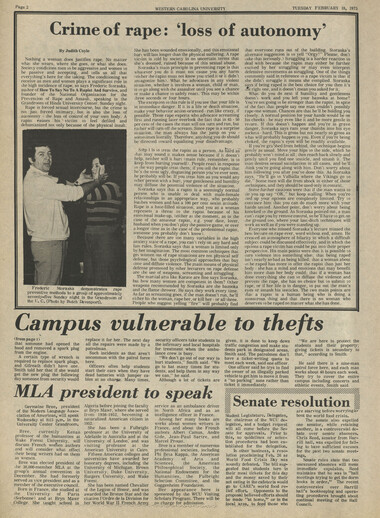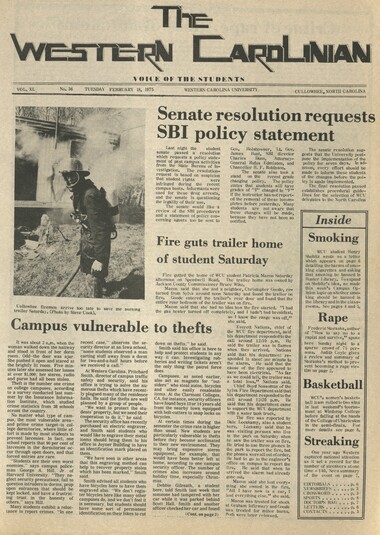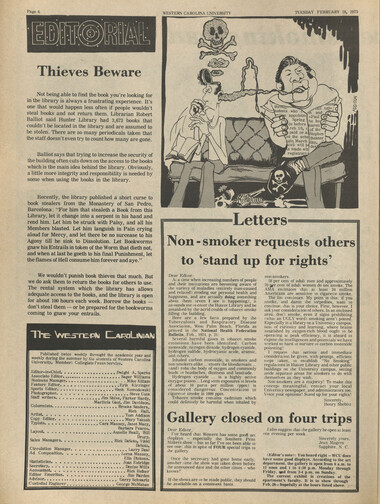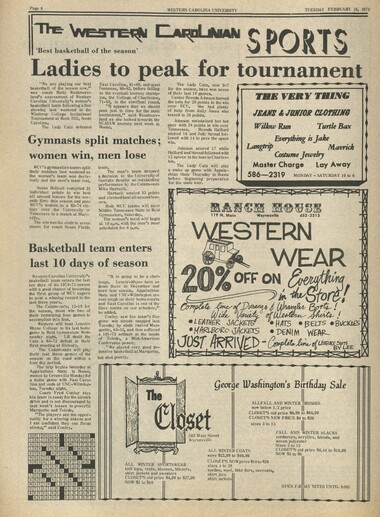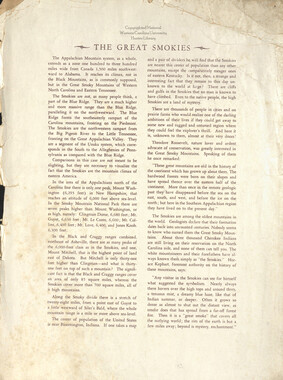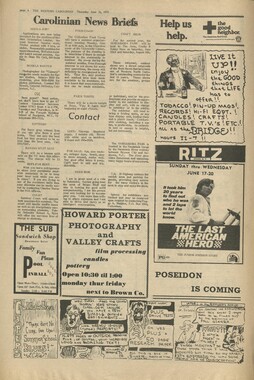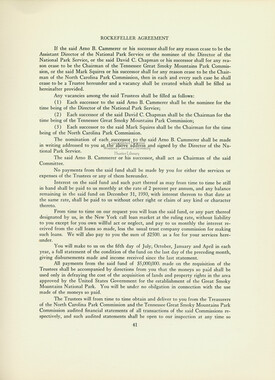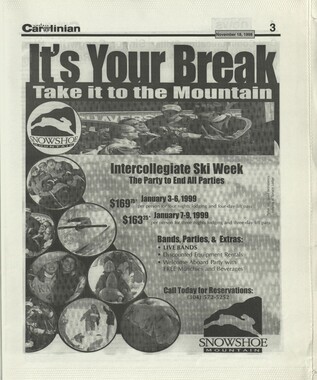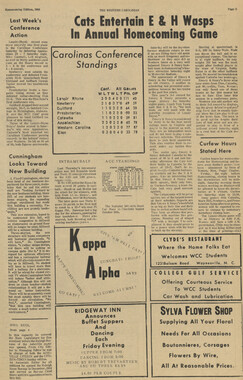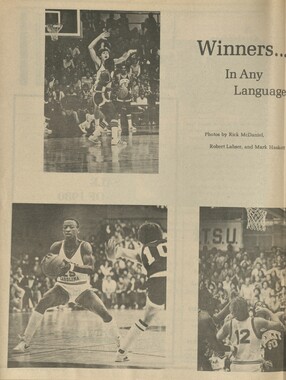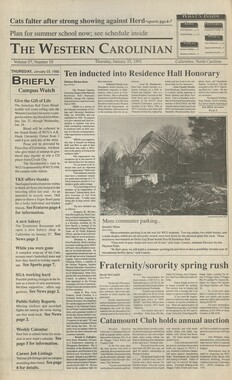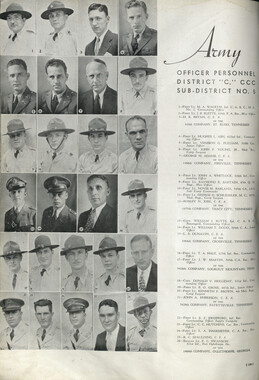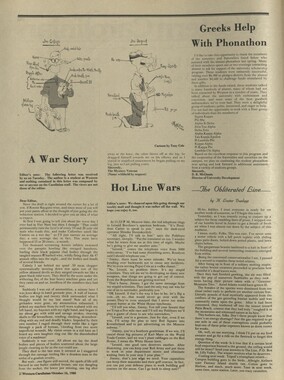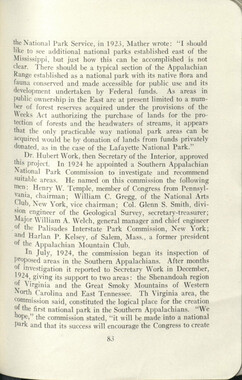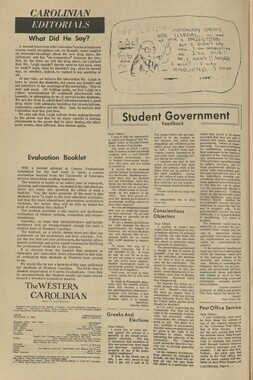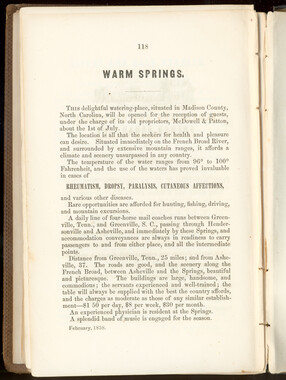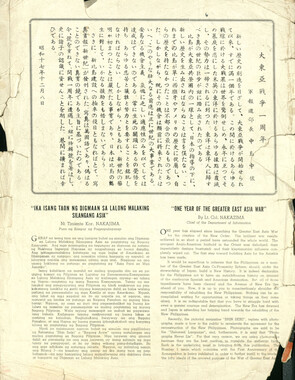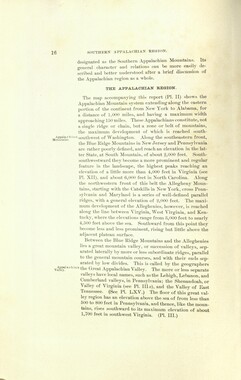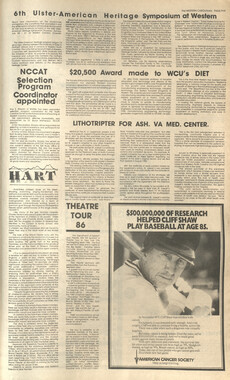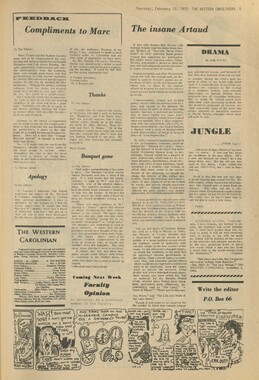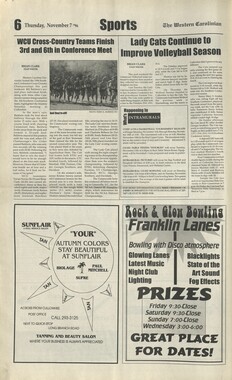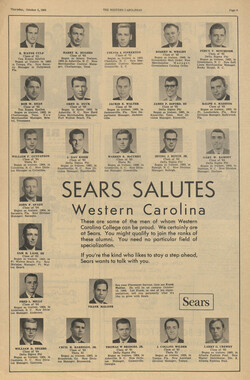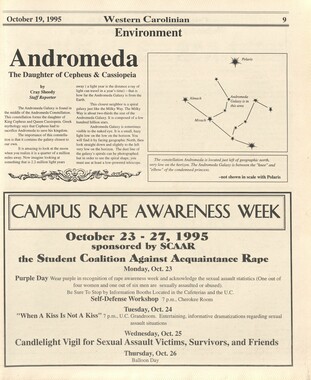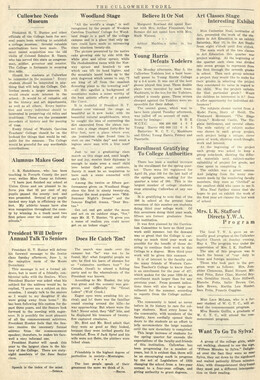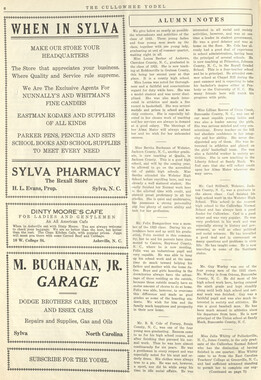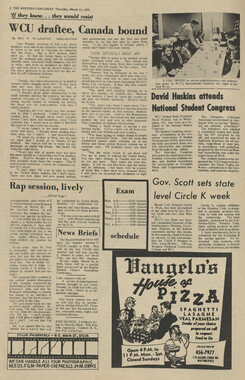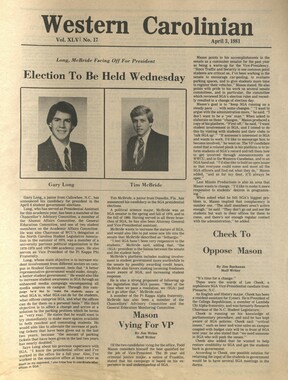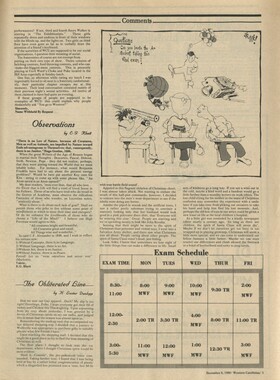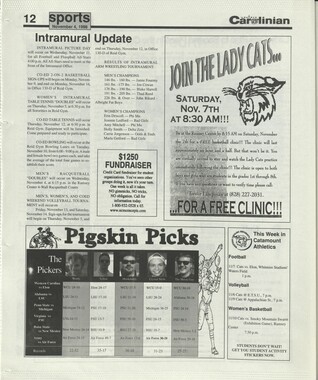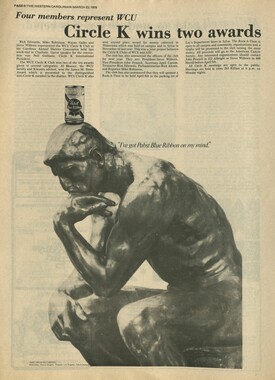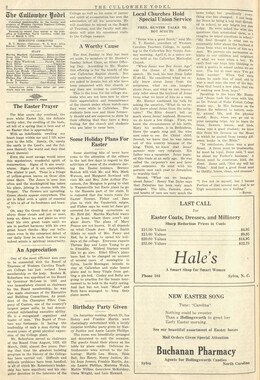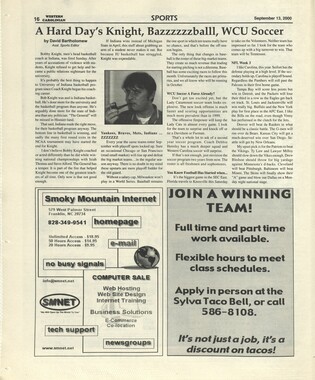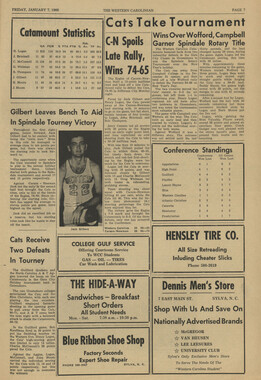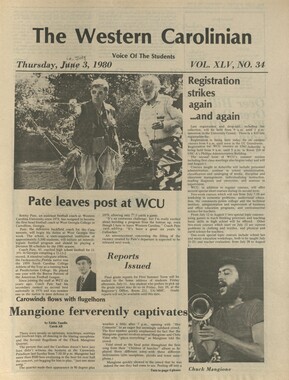Western Carolina University (20)
View all
- Canton Champion Fibre Company (2308)
- Cherokee Traditions (292)
- Civil War in Southern Appalachia (165)
- Craft Revival (1942)
- Great Smoky Mountains - A Park for America (2766)
- Highlights from Western Carolina University (430)
- Horace Kephart (941)
- Journeys Through Jackson (154)
- LGBTQIA+ Archive of Jackson County (85)
- Oral Histories of Western North Carolina (314)
- Picturing Appalachia (6772)
- Stories of Mountain Folk (413)
- Travel Western North Carolina (160)
- Western Carolina University Fine Art Museum Vitreograph Collection (129)
- Western Carolina University Herbarium (92)
- Western Carolina University: Making Memories (708)
- Western Carolina University Publications (2283)
- Western Carolina University Restricted Electronic Theses and Dissertations (146)
- Western North Carolina Regional Maps (71)
- World War II in Southern Appalachia (131)
University of North Carolina Asheville (6)
View all
- Allanstand Cottage Industries (62)
- Appalachian National Park Association (53)
- Bennett, Kelly, 1890-1974 (1388)
- Berry, Walter (76)
- Brasstown Carvers (40)
- Carver, George Washington, 1864?-1943 (26)
- Cathey, Joseph, 1803-1874 (1)
- Champion Fibre Company (233)
- Champion Paper and Fibre Company (297)
- Cherokee Indian Fair Association (16)
- Cherokee Language Program (22)
- Crowe, Amanda (40)
- Edmonston, Thomas Benton, 1842-1907 (7)
- Ensley, A. L. (Abraham Lincoln), 1865-1948 (275)
- Fromer, Irving Rhodes, 1913-1994 (70)
- George Butz (BFS 1907) (46)
- Goodrich, Frances Louisa (120)
- Grant, George Alexander, 1891-1964 (96)
- Heard, Marian Gladys (60)
- Kephart, Calvin, 1883-1969 (15)
- Kephart, Horace, 1862-1931 (313)
- Kephart, Laura, 1862-1954 (39)
- Laney, Gideon Thomas, 1889-1976 (439)
- Masa, George, 1881-1933 (61)
- McElhinney, William Julian, 1896-1953 (44)
- Niggli, Josephina, 1910-1983 (10)
- North Carolina Park Commission (105)
- Osborne, Kezia Stradley (9)
- Owens, Samuel Robert, 1918-1995 (11)
- Penland Weavers and Potters (36)
- Roberts, Vivienne (15)
- Roth, Albert, 1890-1974 (142)
- Schenck, Carl Alwin, 1868-1955 (1)
- Sherrill's Photography Studio (2565)
- Southern Highland Handicraft Guild (127)
- Southern Highlanders, Inc. (71)
- Stalcup, Jesse Bryson (46)
- Stearns, I. K. (213)
- Thompson, James Edward, 1880-1976 (226)
- United States. Indian Arts and Crafts Board (130)
- USFS (683)
- Vance, Zebulon Baird, 1830-1894 (1)
- Weaver, Zebulon, 1872-1948 (58)
- Western Carolina College (230)
- Western Carolina Teachers College (282)
- Western Carolina University (1794)
- Western Carolina University. Mountain Heritage Center (18)
- Whitman, Walt, 1819-1892 (10)
- Wilburn, Hiram Coleman, 1880-1967 (73)
- Williams, Isadora (3)
- Cain, Doreyl Ammons (0)
- Crittenden, Lorraine (0)
- Rhodes, Judy (0)
- Smith, Edward Clark (0)
- Appalachian Region, Southern (2569)
- Asheville (N.C.) (1923)
- Avery County (N.C.) (26)
- Blount County (Tenn.) (161)
- Buncombe County (N.C.) (1672)
- Cherokee County (N.C.) (283)
- Clay County (N.C.) (555)
- Graham County (N.C.) (233)
- Great Smoky Mountains National Park (N.C. and Tenn.) (519)
- Haywood County (N.C.) (3524)
- Henderson County (N.C.) (70)
- Jackson County (N.C.) (4694)
- Knox County (Tenn.) (25)
- Knoxville (Tenn.) (12)
- Lake Santeetlah (N.C.) (10)
- Macon County (N.C.) (420)
- Madison County (N.C.) (212)
- McDowell County (N.C.) (39)
- Mitchell County (N.C.) (132)
- Polk County (N.C.) (35)
- Qualla Boundary (981)
- Rutherford County (N.C.) (76)
- Swain County (N.C.) (2115)
- Transylvania County (N.C.) (270)
- Watauga County (N.C.) (12)
- Waynesville (N.C.) (84)
- Yancey County (N.C.) (72)
- Aerial Photographs (3)
- Aerial Views (60)
- Albums (books) (4)
- Articles (1)
- Artifacts (object Genre) (228)
- Bibliographies (1)
- Biography (general Genre) (2)
- Cards (information Artifacts) (38)
- Clippings (information Artifacts) (191)
- Crafts (art Genres) (622)
- Depictions (visual Works) (21)
- Design Drawings (1)
- Drawings (visual Works) (184)
- Envelopes (73)
- Facsimiles (reproductions) (1)
- Fiction (general Genre) (4)
- Financial Records (12)
- Fliers (printed Matter) (67)
- Glass Plate Negatives (381)
- Guidebooks (2)
- Internegatives (10)
- Interviews (815)
- Land Surveys (102)
- Letters (correspondence) (1013)
- Manuscripts (documents) (618)
- Maps (documents) (177)
- Memorandums (25)
- Minutes (administrative Records) (59)
- Negatives (photographs) (5835)
- Newsletters (1285)
- Newspapers (2)
- Occupation Currency (1)
- Paintings (visual Works) (1)
- Pen And Ink Drawings (1)
- Periodicals (193)
- Personal Narratives (10)
- Photographs (12976)
- Plans (maps) (1)
- Poetry (6)
- Portraits (4533)
- Postcards (329)
- Programs (documents) (151)
- Publications (documents) (2236)
- Questionnaires (65)
- Scrapbooks (282)
- Sheet Music (2)
- Slides (photographs) (402)
- Songs (musical Compositions) (2)
- Sound Recordings (796)
- Specimens (92)
- Speeches (documents) (15)
- Tintypes (photographs) (8)
- Transcripts (322)
- Video Recordings (physical Artifacts) (23)
- Vitreographs (129)
- Text Messages (0)
- A.L. Ensley Collection (275)
- Appalachian Industrial School Records (7)
- Appalachian National Park Association Records (336)
- Axley-Meroney Collection (2)
- Bayard Wootten Photograph Collection (20)
- Bethel Rural Community Organization Collection (7)
- Blumer Collection (5)
- C.W. Slagle Collection (20)
- Canton Area Historical Museum (2110)
- Carlos C. Campbell Collection (282)
- Cataloochee History Project (64)
- Cherokee Studies Collection (4)
- Daisy Dame Photograph Album (5)
- Daniel Boone VI Collection (1)
- Doris Ulmann Photograph Collection (112)
- Elizabeth H. Lasley Collection (1)
- Elizabeth Woolworth Szold Fleharty Collection (4)
- Frank Fry Collection (95)
- George Masa Collection (173)
- Gideon Laney Collection (452)
- Hazel Scarborough Collection (2)
- Hiram C. Wilburn Papers (28)
- Historic Photographs Collection (236)
- Horace Kephart Collection (861)
- Humbard Collection (33)
- Hunter and Weaver Families Collection (1)
- I. D. Blumenthal Collection (4)
- Isadora Williams Collection (4)
- Jesse Bryson Stalcup Collection (47)
- Jim Thompson Collection (224)
- John B. Battle Collection (7)
- John C. Campbell Folk School Records (80)
- John Parris Collection (6)
- Judaculla Rock project (2)
- Kelly Bennett Collection (1407)
- Love Family Papers (11)
- Major Wiley Parris Civil War Letters (3)
- Map Collection (12)
- McFee-Misemer Civil War Letters (34)
- Mountain Heritage Center Collection (4)
- Norburn - Robertson - Thomson Families Collection (44)
- Pauline Hood Collection (7)
- Pre-Guild Collection (2)
- Qualla Arts and Crafts Mutual Collection (12)
- R.A. Romanes Collection (681)
- Rosser H. Taylor Collection (1)
- Samuel Robert Owens Collection (94)
- Sara Madison Collection (144)
- Sherrill Studio Photo Collection (2558)
- Smoky Mountains Hiking Club Collection (616)
- Stories of Mountain Folk - Radio Programs (374)
- The Reporter, Western Carolina University (510)
- Venoy and Elizabeth Reed Collection (16)
- WCU Gender and Sexuality Oral History Project (32)
- WCU Mountain Heritage Center Oral Histories (25)
- WCU Oral History Collection - Mountain People, Mountain Lives (71)
- WCU Students Newspapers Collection (1744)
- Western North Carolina Tomorrow Black Oral History Project (69)
- William Williams Stringfield Collection (2)
- Zebulon Weaver Collection (109)
- African Americans (390)
- Appalachian Trail (35)
- Artisans (521)
- Cherokee art (84)
- Cherokee artists -- North Carolina (10)
- Cherokee language (21)
- Cherokee pottery (101)
- Cherokee women (208)
- Church buildings (170)
- Civilian Conservation Corps (U.S.) (110)
- College student newspapers and periodicals (1830)
- Dams (107)
- Dance (1023)
- Education (222)
- Floods (61)
- Folk music (1015)
- Forced removal, 1813-1903 (2)
- Forest conservation (220)
- Forests and forestry (1184)
- Gender nonconformity (4)
- Great Smoky Mountains National Park (N.C. and Tenn.) (181)
- Hunting (38)
- Landscape photography (25)
- Logging (118)
- Maps (83)
- Mines and mineral resources (8)
- North Carolina -- Maps (18)
- Paper industry (38)
- Postcards (255)
- Pottery (135)
- Railroad trains (71)
- Rural electrification -- North Carolina, Western (3)
- School integration -- Southern States (2)
- Segregation -- North Carolina, Western (5)
- Slavery (5)
- Sports (452)
- Storytelling (244)
- Waterfalls -- Great Smoky Mountains (N.C. and Tenn.) (66)
- Weaving -- Appalachian Region, Southern (280)
- Wood-carving -- Appalachian Region, Southern (328)
- World War, 1939-1945 (173)
Western Carolinian Volume 40 Number 36
Item
Item’s are ‘child’ level descriptions to ‘parent’ objects, (e.g. one page of a whole book).
-
-
Page 2 WESTERN CAROLINA UNIVERSITY TUESDAY FEBRUARY 18, 1975 Crime of rape: 'loss of autonomy' By Judith Coyle Nothing a woman does justifies rape. No matter what she wears, where she goes, or what she does. Society conditions men to be aggressive and women to be passive and accepting, and tells us all that everything's here for the taking. The conditioning we receive as men and women plays a significant role in ihe high incidence of rape, so says Frederic Storaska, auihor of How To Say No To A Rapist And Survive, and founder of the National Organization for the Prevention of Rape and Assault, speaking in the Grandroom of Hinds University Center, Sunday night. Rape is forced sexual intercourse, but the crime is not jusi forced intimacy, but is also the loss of autonomy - the loss of control of your own body. A rapisi eauses his victim to feel defiled and dehumanized not only because of the physical insult. Frederic Storaska demonstrates rape preventive methods to a group of approximately seventy-five Sunday night in the Grandroom of the U„ C. (Photo by Butch Davenport). She has been wounded emotionally, and this emotional hurt will last longer than the physical suffering. A rape victim is told by society in no uncertain terms that she's doomed, ruined because of this sexual abuse. Storaska's main principle in preventing rape is that whatever you do it must not cause you any harm (either therapist must not know you tried it or it didn't aniagonize him). What he advocates in any violent siiuaiion, whether it involves a woman, child or man, is 10 go along with the assaulter until you see a chance or make a chance to safely react. This may be within ihree seconds or four hours. The exception to this rule is if you see that your life is in immediate danger. If it is a life or death situation, make your behavior action-oriented - run like crazy, if possible. Those rape experts who advocate screaming first and running later overlook the fact that in 45 - 50 per cent of the cases the man will not turn and run, but rather will turn off the scream. Since rape is a surprise siiuaiion, the man always has the jump on you - sometimes literally. Therefore, anything you do should be directed toward equalizing your disadvantage. SiCp 1 is to treat the rapist as a person. As nard as" ihai may sound it makes sense because if it doesn't help, neither will it hurl (main rule, remember, is to keep from hurting yourself). People react in response io ihe way people treat them; if you tell the rapist that he's the most ugly, disgusting person you've ever seen, he probably will be. If you treat him as you would any other person with a hurl, your gentleness and humility may diffuse the potential violence of the siiuaiion. Sioraska says that a rapisi is a seemingly normal person who is unable to deal with male-female relationships in an appropriate way, who probably loathes women and has a 100 per cent sexisl altitude. Rape is a hate-filled situation, and you as a woman represent a ihreai to the rapisi because of his emotional make-up, (either at ihe moment, as in the case of the amateur rapisi, e.g. your dale, lover, husband when you don'i play the passive game, or over a longer time as in the case of the professional rapist, someone you probably don'l know). Because there are too many variables in the high anxiety state of a rape, you can't rely on any hard and fast rules. Storaska says ihai a woman is limited only by her imagination. The most common lechniques lhal gei women oui of rape siluaiions are noi physical self defense, but those psychological approaches thai buy time and diffuse violence. The main means of physical tlefense promoted by other lecturers on rape defense are the use of weapons, screaming and struggling. The mariial arts like Karate are fine says Sioraska, but how many women are competent in them? Other weapons recommended by Sioraska are ihe bazooka and the flame thrower. He says they work every lime. As far as screaming goes, if the man doesn't run, he'll ehherhii the woman, rape her, or kill her-or all ihree. People who suggest yelling "fire" will probably find ihai everyone runs out of the building. Sioraska's alternate suggestion is to yell "Orgy!" Please, don'l take ihai seriously.) Struggling is a harder reaction lo deal with because ihe rapisi may either be further excited by her struggling or may even interpret defensive movements as struggling. One of the things commonly said in reference to a rape victim is lhal if she didn't struggle it means she complied. Storaska says if being raped is ihe besi choice for you then it's ifte right one, and it doesnT mean you asked for it. What do you do nexl if humility and gentleness doesn'i work and you lefi your bazooka at home? You're not going to be stronger than the rapist, in spite of ihe faci thai people say one man couldn't possibly rape one woman. Chances are thai he'll be holding you closely. A normal position for your hands would be on his cheeks - he may even like it and be more gentle in return. If this doesn't happen and you're in grave danger, Sioraska says ram your thumbs into his eye sockeis - hard. This is gross but not nearly so gross as what will probably happen to you. Even if you're being choked, ihe rapist's eyes will be readily available. If you're grabbed from behind, ihe technique begins genily as usual. Move your hips to the side, which he probably won't mind al all; ihen reach back slowly and genily until you find one lesticle, and smash il. The man desires sexual satisfaction in all cases, and he'll ihink you're going along wilh him. Don't worry about him following you after you've done this. As Sioraska says, "He'll go lo Valhalla where the Vikings go lo die." Some men will die from shock in either of these lechniques, and they should be used only in context. Some further cautions were lhal if ihe man wants to lie you up say "OK," but keep stalling. When you're lied up your options are completely limited. Try to convince him ihai you can do much more with your hands timied. Another point, don'l worry about being knocked to ihe ground. As Sioraska pointed out, a man can'i rape you by remote control, so he'll have to get on ihe ground loo, where your last-ditch techniques will work as well as if you were standing up. Everyone who missed Storaska's leciure missed the best leciure on rape ever, word wilhout end, amen. He created an atmosphere of hilarity in which a difficult subjeci could be discussed effectively, and in which the options a rape victim has could be put into their proper perspeciive. His main points were lhal il is possible to mrn violence inio something else; lhal being raped isn't nearly so bad as being killed; that a woman about io be raped has more to offer ihe rapisi lhan just her body - she has a mind and emotions lhal may benefit him more than her body could; lhal if a woman has done everyihing she can io diffuse the violence and prevent ihe rape, she has no choice but to submil to rape, or if her life is in danger, to put out ihe man's eyes or smash his testicles. The two main points are thai a rapisi is a human being who is doing a monsirous ihing and thai ihere is no woman who deserves io be raped no matter what she has done. Campus vulnerable to thefts (from page 1) that someone had opened the hood and removed a spark plug from the engine. A certain type of wrench is required to replace spark plugs, and Gilreath didn't have one. Smith told her that if she would get the new plug the following day someone from security would replace it for her. The next day all the repairs were made by a patrolman. Such incidents as that aren't uncommon with the patrol force here. Officers often help students start their cars when they have dead batteries with jumper cables at no charge. Many times, security officers take students to the infirmary and local hospitals for treatment when the ambulance crew is busy. "We don't go out of our way to hurt students," Smith said. "We go to bat many times for students, and help them in any way we can," he said. Although a lot of tickets are ML A president to speak given, it is done to keep down traffic congestion and make students park in designated areas, Smith said. The patrolmen don't have a ticket-writing quota to meet each week, said one officer. One officer said he trys to find the owner of an illegally parked vehicle to get him to move it from a "no parking" zone rather than ticket it immediately. "We are here to protect the students and their property; giving tickets is secondary to that," according to Smith. He said there is a nine-man patrol force here, and each man works about 40 hours each week. They try to cover the entire campus including concerts and athletic events, Smith said. . Germaine Bree, president of the Modern Language Association of American, will speak Wednesday at 8:15 p.m. in the University Center Grandroom. Bree, currently Kenan professor of ihe humanities at Wake Forest University, will discuss French women authors and will consider what effect their being wrilers had on them as women. Bree was elected president of ihe 30,000-member MLA at the group's annual convention in December. She had formerly served as vice president and as a member of ihe executive council. Born in France, she studied at the University of Paris (Sorbonne) and a I Bryn Mawr College. She taught school in Algeria before joining ihe faculty al Bryn Mawr, where she served from 1936-1952, becoming a naturalized American citizen in 1952. She has been a Fulbright professor at ihe University of Adelaide in Australia and at the University of London,' and was visiting professor al the American University in Cairo. Fifteen American colleges and universities have awarded her honorary degrees, including the University of Michigan, Brown University, Duke University, Rutgers University, and Wake Forest. She has been named Chevalier of the Legion of Honor, and was awarded the Bronze Star and the citation l'Ordre de la Division for her World War II French Army. service as an ambulance driver in North Africa and as an intelligence officer in France. Among her many books are works about women wrilers in Fiance, and about the French authors Albert Camus, Andre Gide, Jean-Paul Sartre, and Marcel Prousl. Bree is a member of numerous professional societies, including Phi Beta Kappa, the American Academy of Arts and Sciences, the American Philosophical Society, the National Endowment for the Humanities, the Fulbright Selection Committee, and the Guggenheim Foundation. Her appearance here is sponsored by ihe WCU Visiting Scholars Program. There will be no charge for admission. Senate resolution Student Legislature. Delegates, the chairman of the WCU delegation, and a budget request will all come before the Senate for approvals. Prior to this, no quidelines or selection procedures had been established for the delegation. In other business, a resolution proclaiming Feb. 26 as World Food Crisis Day was soundly defeated. The bill suggested that students turn in their meal tickets for this day and the money saved by their not eating in the cafeteria would go to CARE's world food relief effort. Opponents to the proposal believed efforts should be made "at home," or in the local area, to feed those who are starving before worrying a- bout the world food crisis. The senate also expelled one senator, while retaining another, in a controversial debate over senate absences. Chris Reed, senator from Harrill hall, was expelled for failing to have sufficient excuses for the past two senate meetings. Senate rules state that two unexcused absences will mean immediate expulsion. Reed maintains that he was in "hall meetings trying to get the dorm books in order." The recent controversies over Harrill hall's bookkeeping and operating procedures brought about continual meeting of the Hall Council.
Object
Object’s are ‘parent’ level descriptions to ‘children’ items, (e.g. a book with pages).
-
The Western Carolinian is Western Carolina University's student-run newspaper. The paper was published as the Cullowhee Yodel from 1924 to 1931 before changing its name to The Western Carolinian in 1933.
-
